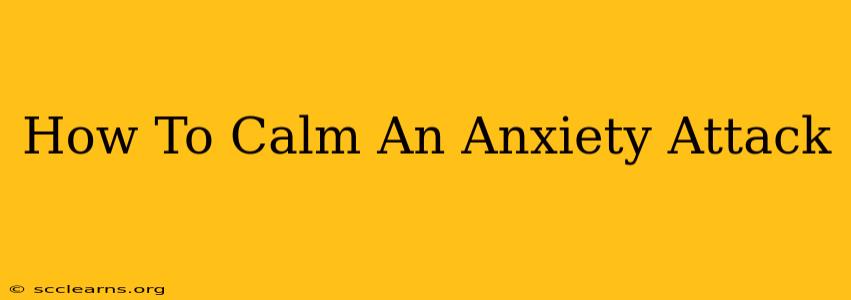Anxiety attacks can feel overwhelming, leaving you breathless and panicked. But understanding how to manage them is key to regaining control and finding relief. This guide provides practical techniques you can use to calm an anxiety attack and prevent future episodes.
Recognizing the Symptoms of an Anxiety Attack
Before diving into coping mechanisms, it's crucial to recognize the signs of an anxiety attack. Common symptoms include:
- Rapid heartbeat: Your heart may feel like it's racing.
- Shortness of breath: You might feel like you can't catch your breath, experiencing hyperventilation.
- Sweating: Excessive sweating is a common physical manifestation.
- Trembling or shaking: Your body may involuntarily shake.
- Feeling of choking: A sensation of tightness or constriction in your throat.
- Chest pain or discomfort: Pain or pressure in the chest area.
- Nausea or upset stomach: Digestive issues are frequently associated with anxiety.
- Dizziness or lightheadedness: You might feel faint or unsteady.
- Fear of losing control or dying: This overwhelming fear is a hallmark of an anxiety attack.
- Chills or hot flashes: Fluctuations in body temperature.
Understanding these symptoms can help you identify an attack early and begin implementing coping strategies immediately.
Immediate Actions to Calm an Anxiety Attack
When an anxiety attack hits, quick action is essential. Try these techniques:
1. Practice Deep Breathing Exercises:
Deep, controlled breathing can help slow your racing heart and regulate your nervous system. Try the 4-7-8 technique:
- Inhale slowly through your nose for a count of 4.
- Hold your breath for a count of 7.
- Exhale completely through your mouth for a count of 8.
- Repeat several times.
Other deep breathing techniques, like box breathing, can also be effective. The goal is to focus on your breath and slow down your body's physiological response.
2. Grounding Techniques:
Grounding techniques help bring you back to the present moment. Try these:
- 5-4-3-2-1 Method: Name 5 things you can see, 4 things you can touch, 3 things you can hear, 2 things you can smell, and 1 thing you can taste. This anchors you in the present.
- Focus on Sensory Details: Pay close attention to the sensations in your body: What do you feel under your feet? What do you see in front of you? Focus on details to distract from anxious thoughts.
3. Muscle Relaxation Techniques:
Progressive muscle relaxation involves tensing and releasing different muscle groups to relieve tension. Start with your toes and work your way up your body, holding each tension for a few seconds before releasing. This can significantly reduce physical symptoms of anxiety.
4. Mindfulness and Meditation:
Even a few minutes of mindfulness meditation can make a difference. Focus on your breath, body sensations, or a calming mantra to quiet racing thoughts. Apps like Calm or Headspace can guide you through meditation exercises.
5. Change Your Environment:
If possible, move to a quieter, more comfortable space. Fresh air can also be helpful. Step outside for some fresh air if you feel safe and able to do so.
Long-Term Strategies for Managing Anxiety
While these techniques offer immediate relief, addressing anxiety long-term requires a holistic approach:
- Therapy: Cognitive Behavioral Therapy (CBT) and other therapeutic approaches are highly effective in managing anxiety. A therapist can help you identify triggers, develop coping strategies, and challenge negative thought patterns.
- Lifestyle Changes: Regular exercise, a healthy diet, sufficient sleep, and limiting caffeine and alcohol can significantly impact anxiety levels.
- Support System: Lean on friends, family, or support groups for emotional support. Connecting with others can make a significant difference.
- Medication: In some cases, medication may be necessary to manage anxiety symptoms. Consult a doctor or psychiatrist to discuss your options.
Remember: Anxiety attacks are treatable. By learning these techniques and seeking professional help when needed, you can regain control and live a fulfilling life free from the overwhelming grip of anxiety. Don't hesitate to reach out for support – you are not alone.

